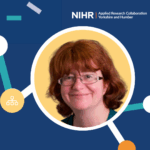Use of a modified World Café process to discuss and set priorities for a Community of Practice supporting implementation of ReQoL a new mental health and quality of life Patient Reported Outcome Measure (PROM)
Patient reported outcome measures (PROMs) are a means of assessing the quality and effectiveness of care from the patient’s perspective [1]. However, the routine use of PROMs in clinical practice can be difficult to implement [2, 3]. New challenges arise at different stages of the implementation process and organisations need to invest time and financial resources into designing an appropriate strategy, information systems, providing technical support and preparing staff [4, 5].
Recovering Quality of Life (ReQoL) is a PROM that was specifically designed to measure mental health service users’ perspectives of recovery and quality of life [6,7,8]. It is a co-produced, service user-centred outcome measure tested by over 6000 mental health service users. It is able to detect change across a broad spectrum of mild to severe mental health conditions.
In May 2016 a licence to use the ReQoL measures became freely available to the NHS and publicly funded research. At the time of publication, 149 licences had been issued worldwide and eleven official translations had been made available. The team that developed ReQoL has continued to collaborate with mental health trusts across the country to support the implementation of ReQoL. The National Institute for Health Research and Applied Research Collaboration (NIHR ARC YHFootnote1), and the preceding NIHR CLAHRC-YH, along with the ReQoL development team have helped to guide and fund this work. The NIHR CLAHRC-YH supported two national events, the first of which was the launch of ReQoL at the Houses of Parliament in October 2016. More recently in November 2018, over 70 people, from 23 organisations, attended a second event focused on the development of a ReQoL Community of Practice.
Community of Practices (CoPs) have existed in sectors such as education and business for over 30 years [9], operating as networks and support groups for people who share a common set of problems or interests. Members of CoPs maintain and build links with each other for the purposes of social interaction, knowledge sharing, knowledge creation and identity building [9, 10].
Details:
Theme:
Author(s):

Theme Manager

Theme Co-Lead